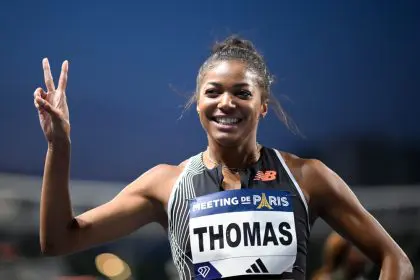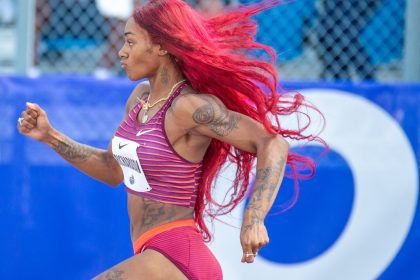Sports betting platform FanDuel has permanently removed a customer who engaged in sustained harassment of Olympic champion Gabby Thomas during a professional track and field event, demonstrating the growing accountability standards within the sports gambling industry. The incident highlights emerging concerns about the intersection of sports betting and fan behavior at live sporting events.
The banned individual documented his harassment campaign against the three-time Olympic gold medalist during the Grand Slam Track meet in Philadelphia, combining aggressive heckling with financial betting against the athlete’s performance. His actions have prompted both corporate accountability measures and league-level investigations into spectator conduct standards.
The case represents a significant precedent for sports betting companies taking proactive measures to address customer behavior that crosses professional boundaries, particularly when directed toward individual athletes during competition. The incident has generated widespread discussion about appropriate fan conduct and the responsibilities of gambling platforms regarding customer actions.
Sustained harassment campaign documented on social media
The banned bettor, who identifies himself as “The Track and Field Bully” on social media platforms, recorded and published extensive video footage of his targeted harassment against Thomas during multiple events at the Philadelphia track meet. The documentation reveals a calculated approach to disrupting the athlete’s performance while monetizing the behavior through sports betting.
During Sunday’s 100-meter race, the individual positioned himself at the starting line and engaged in prolonged verbal harassment as Thomas prepared for competition. The recorded heckling included personal attacks on her athletic abilities, references to previous race performances, and inappropriate comments about her personal life and marriage.
The harassment continued beyond the immediate competition area, with additional footage showing the individual following Thomas around the stadium as she interacted with fans and signed autographs for children. This behavior pattern suggests premeditated targeting rather than spontaneous fan enthusiasm or disappointment.
The perpetrator’s social media posts explicitly connected his harassment tactics to his gambling success, claiming credit for influencing Thomas’s performance outcomes while celebrating his betting profits. This direct correlation between harassment and financial gain raises significant ethical questions about spectator behavior and sports betting dynamics.
FanDuel implements comprehensive customer removal
The sports betting platform announced the permanent customer ban through an official statement emphasizing zero tolerance for abusive behavior directed toward athletes. The company’s response represents one of the most definitive actions taken by a major gambling platform regarding customer conduct at sporting events.
FanDuel’s statement explicitly condemns threatening or harassing behavior toward athletes as unacceptable conduct that has no place in sports entertainment. The company’s decisive action suggests a broader industry recognition that customer behavior outside platform interactions can warrant account termination when it involves athlete harassment.
The betting slip shared by the banned customer showed a $1,000 parlay wager selecting Melissa Jefferson-Wooden to defeat Thomas in the competition. The substantial bet amount combined with the documented harassment suggests the individual’s financial investment may have motivated his disruptive behavior during the event.
Industry observers note that this action establishes a precedent for sports betting companies holding customers accountable for conduct that occurs at live sporting events, even when the betting activity itself occurs through legitimate platform channels. This expanded accountability framework could influence industry standards for customer conduct policies.
Olympic champion responds to harassment pattern
Thomas, who earned three gold medals at the Paris Olympics, addressed the harassment incident through her own social media platforms, describing the individual’s behavior as inappropriate and concerning. Her response highlighted the broader impact of such conduct on athlete safety and fan experience at sporting events.
The Olympic champion specifically noted that the harassment occurred while she was engaging with fans, particularly children seeking autographs and photographs. This context emphasizes how individual misconduct can negatively affect the broader fan experience and athlete accessibility at professional events.
Thomas distinguished between acceptable heckling and problematic behavior, indicating that following athletes around venues crosses professional boundaries regardless of the verbal content involved. Her measured response demonstrates both professional composure and clear boundary-setting regarding acceptable fan interaction standards.
The athlete’s public response has generated supportive commentary from fellow competitors, sports commentators, and fans who recognize the inappropriate nature of targeted harassment during professional competition. This support network demonstrates growing awareness within the athletic community about the need for protective measures against excessive fan behavior.
Grand Slam Track launches investigation
The professional track and field league announced a comprehensive investigation into the harassment incident, indicating that athlete protection represents a priority concern for the organization. The league’s response suggests potential policy changes to prevent similar incidents at future events.
Grand Slam Track’s official statement described the documented behavior as reprehensible and indicated that additional safeguards would be implemented to prevent similar incidents. These enhanced security measures could include stricter spectator conduct policies and improved monitoring of fan behavior at events.
The league’s investigation aims to identify all individuals involved in the harassment while developing appropriate consequences for the documented misconduct. This process could establish precedents for how professional sports organizations address targeted harassment of individual athletes by spectators.
League officials emphasized that such behavior will not be tolerated at their events, signaling a commitment to maintaining professional standards for both competition and spectator conduct. This position aligns with broader sports industry efforts to create safe environments for athlete performance and fan engagement.
Industry implications for betting and fan conduct
The incident raises broader questions about the relationship between sports betting and fan behavior, particularly regarding whether financial stakes in athletic outcomes influence spectator conduct at live events. The explicit connection between harassment and betting success in this case suggests potential systemic concerns.
Sports betting industry leaders are observing this case as a potential model for addressing customer conduct that extends beyond platform interactions. The precedent could influence how other gambling companies approach customer accountability for behavior at sporting events.
Professional sports leagues are also examining the incident as they develop policies regarding spectator conduct and athlete protection. The intersection of gambling interests and fan behavior presents new challenges for maintaining appropriate competitive environments.
Academic researchers studying sports gambling effects note this case as evidence of potential behavioral changes among bettors who have financial stakes in individual athlete performance. The documentation of harassment connected to betting outcomes provides rare direct evidence of such behavioral patterns.
Athlete protection and spectator standards
The incident highlights ongoing challenges in balancing fan enthusiasm with athlete safety and professional competition standards. Thomas’s experience demonstrates how individual misconduct can create hostile environments that affect both specific athletes and broader sporting event atmospheres.
Professional athletes increasingly face challenges from spectators who view their financial betting interests as justification for inappropriate behavior. This dynamic creates new pressures on athletes beyond traditional competitive challenges and could influence their willingness to engage with fans at events.
Sports organizations are developing enhanced protocols for identifying and addressing problematic spectator behavior before it escalates to harassment levels. These measures include improved security training, clearer conduct policies, and more effective reporting mechanisms for concerning behavior.
The case also demonstrates the role of social media in both documenting misconduct and enabling accountability measures. The perpetrator’s decision to publicize his harassment ultimately facilitated both corporate and league responses that might not have occurred otherwise.
Broader implications for sports entertainment
This incident occurs within a broader context of increasing concerns about spectator behavior at professional sporting events, particularly as sports betting becomes more prevalent and accessible. The combination of financial stakes and live event attendance creates new dynamics that sports organizations must address.
The FanDuel response suggests that sports betting companies recognize their role in promoting responsible customer behavior that extends beyond platform interactions. This expanded responsibility framework could become standard practice across the gambling industry.
Professional sports leagues are evaluating how gambling proliferation affects fan behavior and athlete safety at live events. The documented connection between betting interests and harassment behavior provides concrete evidence for policy development in this area.
The incident also raises questions about social media’s role in both enabling and documenting inappropriate fan behavior, creating opportunities for both misconduct and accountability that previous generations of sports entertainment did not face.












